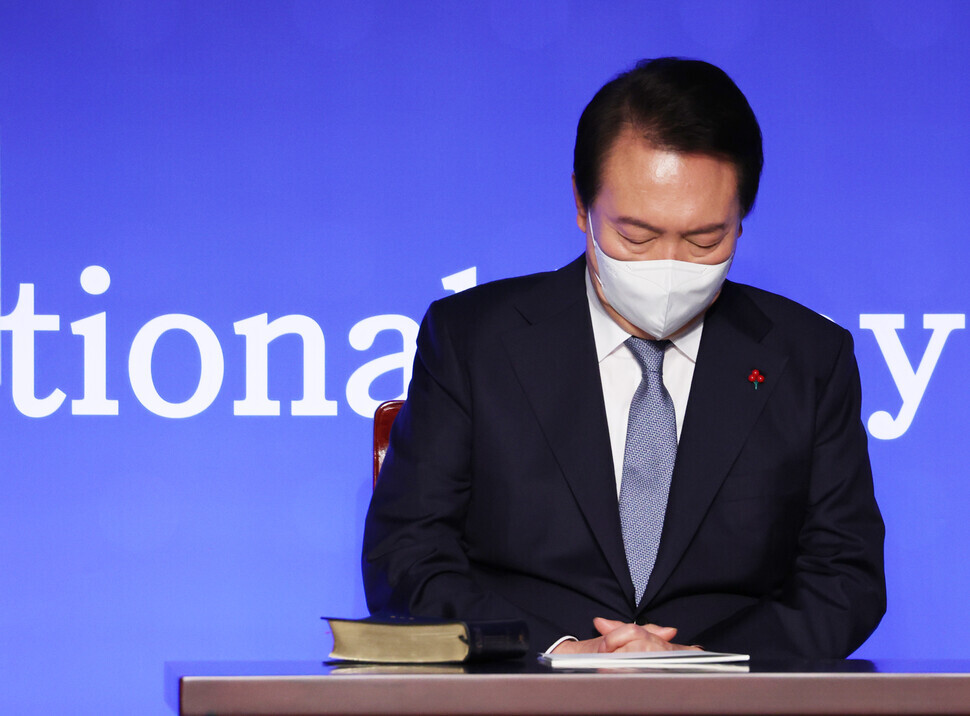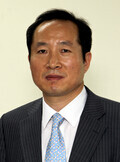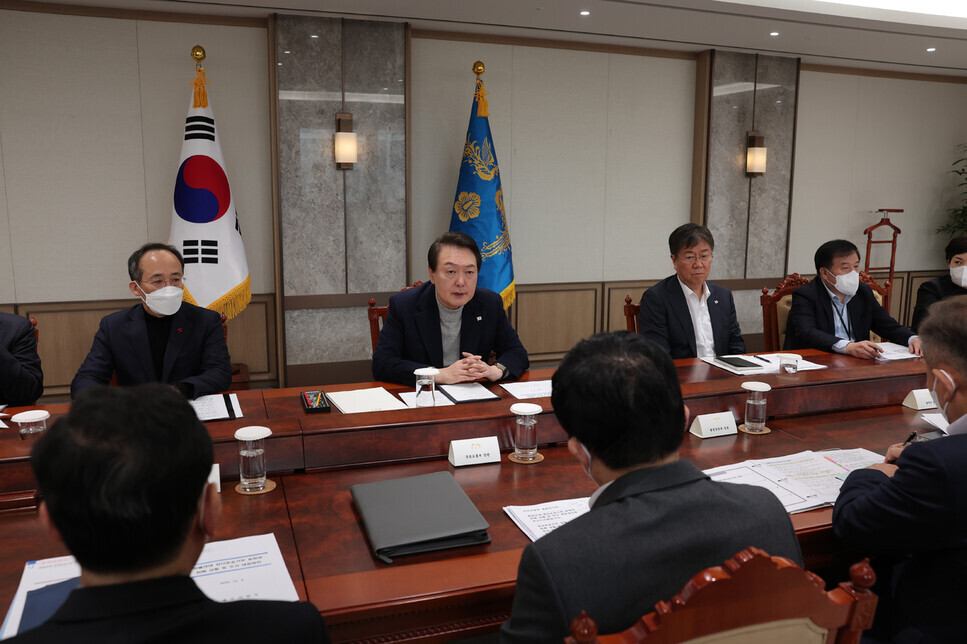hankyoreh
Links to other country sites 다른 나라 사이트 링크
[Column] I awoke one morning and found Korea less advanced, part II


By Park Hyun, editorial writer
When I turned on the television on Sunday afternoon, I came across President Yoon Suk-yeol making a speech.
He was calling for a hard-line response to the Cargo Truckers’ Solidarity Division (TruckSol)’s general strike in a meeting with relevant senior government officials. “The government will never compromise with forces that systematically engage in illegal activities and violence,” his voice echoed. “Ministers are urged to mobilize all administrative powers to get to the bottom of this issue and take timely, severe measures against these illegal activities.”
Yoon repeatedly said the words “illegal” (seven times), “violence” (four times), and the phrase “will get to the bottom of this issue” (two times). It felt as if I was watching a show from the 1980s.
But his remarks alone were not why I was reminded of that time. Rather, it was a result of an accumulating series of events in recent days.
When asked about who was responsible for the Oct. 29 disaster in Itaewon two days after it happened, Lee Sang-min, minister of the interior and safety, shirked all responsibility by saying that “police and security forces were dispersed because there were various disturbances and protests throughout Seoul,” and that “incendiary political assertions mustn’t be made.” These comments were reminiscent of words that the home secretary or the chief security officer would use in the ’80s.
These instances have occurred repeatedly, one after another. The refusal to let journalists with broadcaster MBC board the presidential aircraft, the massive investigation into the former administration and the major figures of the main opposition party, the list goes on. Now they are training their rhetoric against recognizing a labor union’s right to strike, choosing instead to label the industrial action a crime.
It is also unthinkable that the government compared this general strike, an issue with many workers’ livelihoods and safety on the line, to the “North Korean nuclear threat,” and ordered such a harsh response to it.
Efforts to solve problems through dialogue and compromise, which are key in politics, are nowhere to be seen. It is as if the administration thinks it can get away with threatening its people with punishment.
It has gotten to the point where the International Labour Organization (ILO) sent a letter to the government in which they stated that the government has violated the freedom of association and warned the government to not impose criminal sanctions against the strikers.

A month ago, after we went through the Itaewon disaster, I wrote a column titled “I awoke one morning and found Korea less advanced.” Now we’ve gone on to win the epithet of a country with outdated labor policies.
What the leadership of this country is carrying out in various fields such as security, media, labor, and politics, are acts that will undo 30 years’ worth of effort that our society poured into rebuilding itself after ending a military dictatorship.
The language and law enforcement methods may look a little more sophisticated today, but that is only because, at its core, the administration is made up of people who have had more ink smudged onto their fingers from manipulating the law rather than the guns their forefathers wielded.
However, they are equal in the fact that they are taking democracy down a notch. Much like soldiers who judge everything based on whether someone is their enemy or ally, these prosecutors-turned-politicians are still immersed in a dichotomy of “good” versus “evil.”
The ruling party, which should be keeping those individuals in check, are only provoking them.
The leadership of the ruling party claims that the Korean Confederation of Trade Unions is “a force sympathetic to North Korea,” labels them the “second battalion of the Workers’ Party of Korea,” and is trying to frame the unionized workers, in a fashion similar to the military dictatorship of the 1980s.
This 1980s style of national management is appearing in the economic sector, too. Typical of this is the government’s price controls.
Even though energy prices have skyrocketed this year, electricity bills have not kept pace, with KEPCO falling over 30 trillion won (US$22.8 billion) into the red as a result. The government could argue that this was the case under the previous administration, too, but the debt has ballooned to such an extent — last year, it was just 5.8 trillion won — that there’s no comparison. When bonds issued by KEPCO, which was short of operating funds, inundated the bond market, bond interest rates rose, causing chaos even in financial markets.
Just as it did when Gangwon Province applied for reorganization proceedings for Legoland, the government has been busy trying to hush up and bandage the problem, making it worse. This is proving a major burden on households and corporations already struggling with high interest rates. In a densely intertwined capitalist economic ecosystem, problems inevitably arise when the government excessively intervenes in setting prices.
The Chun Doo-hwan administration used to brag about how it gained control of prices, but that was when the Korean economy was small. Korea now has one of the 10 largest economies in the world.
The government cannot control inflation using price controls, practically speaking. On the contrary, price controls are likely to have significant side effects. If insecurity in capital markets spreads and real estate project financing loans go insolvent en masse, the impact could reach not only secondary financial markets, but even the banks, too.
One wonders if the clique of financial bureaucrats that surround the president is even properly reporting the situation. As we’ve seen in emergency economic and public livelihood meetings broadcasted live on TV, the bureaucrats just brag about their accomplishments or bang on about deregulation. These “yes man” bureaucrats appear inadequate for navigating serious times.
The current administration’s competence has been on full display over the last six months.
The domestic and international situation is far too harsh to ignore this disorder in administering national affairs. Ultimately, you cannot control 21st-century Korean society by browbeating and controlling people as you clamor about doing things “according to the law,” or by avoiding responsibility when problems arise.
It’s time for Yoon to humbly accept the criticism against him and seriously consider breaking up the power of the president and abdicating some to the prime minister, a system which is stipulated in the Constitution and was even one of Yoon’s campaign pledges. He must select a new prime minister acceptable to both the ruling party and opposition and substantively resolve major pending issues in the economy and society.
Please direct questions or comments to [english@hani.co.kr]

Editorial・opinion
![[Column] Life on our Trisolaris [Column] Life on our Trisolaris](https://flexible.img.hani.co.kr/flexible/normal/500/300/imgdb/original/2024/0505/4817148682278544.jpg) [Column] Life on our Trisolaris
[Column] Life on our Trisolaris![[Editorial] Penalties for airing allegations against Korea’s first lady endanger free press [Editorial] Penalties for airing allegations against Korea’s first lady endanger free press](https://flexible.img.hani.co.kr/flexible/normal/500/300/imgdb/original/2024/0502/1817146398095106.jpg) [Editorial] Penalties for airing allegations against Korea’s first lady endanger free press
[Editorial] Penalties for airing allegations against Korea’s first lady endanger free press- [Editorial] Yoon must halt procurement of SM-3 interceptor missiles
- [Guest essay] Maybe Korea’s rapid population decline is an opportunity, not a crisis
- [Column] Can Yoon steer diplomacy with Russia, China back on track?
- [Column] Season 2 of special prosecutor probe may be coming to Korea soon
- [Column] Park Geun-hye déjà vu in Yoon Suk-yeol
- [Editorial] New weight of N. Korea’s nuclear threats makes dialogue all the more urgent
- [Guest essay] The real reason Korea’s new right wants to dub Rhee a founding father
- [Column] ‘Choson’: Is it time we start referring to N. Korea in its own terms?
Most viewed articles
- 1New sex-ed guidelines forbid teaching about homosexuality
- 260% of young Koreans see no need to have kids after marriage
- 3Months and months of overdue wages are pushing migrant workers in Korea into debt
- 4Presidential office warns of veto in response to opposition passing special counsel probe act
- 5[Column] Life on our Trisolaris
- 6S. Korea discusses participation in defense development with AUKUS alliance
- 7OECD upgrades Korea’s growth forecast from 2.2% to 2.6%
- 8Japan says it’s not pressuring Naver to sell Line, but Korean insiders say otherwise
- 9Opposition calling for thorough investigation into Pres. Park’s unelected power broker
- 10Ruling and opposition parties agree to special prosecutor for Pres. Park/Choi Sun-sil scandal